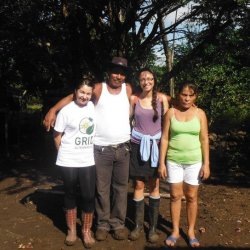Growing up in Eastern Kentucky had its advantages. It may be an impoverished area, struggling with substance addiction, the unhealthy coal industry, lack of jobs and resources, poor food quality, and a breakdown of community. But this area is not alone. All across the country those same problems spring up, from tribal lands to urban settings, if people don’t feel they are important in this world then they inevitably suffer from hopelessness and depression. Anywhere poverty persists you find families grappling with the problems connected to it. But the beautiful aspects can be missed if you don’t look close enough.
One thing that always reminds me of my home is the sense of time, and how it moves from the city pace of nearby larger towns and rolls to a slow crawl in the more rural settings. People understand time differently, it seems, and they learn to value all the minutes of the days whether or not they are packed with excitement and commotion. I think back to my papaw who would sit for hours on the front porch in a lawn chair just enjoying the world around him. As a kid I asked, “what are you doing out here?” I expected that in life you would always be doing and in fact I was probably busy thinking of my own next move. But his reply was always the same, with a chuckle, “watching the traffic”. The fun of that comment is that even though the house faced a two lane highway that had stretched out smoothly before winding up the hillside, there was hardly any traffic.
Growing up in “Kentucky time” I learned to value just being v. always doing. The small things in life, the sounds of the world around me, the breeze sailing through the tree tops. Those are special things we can easily miss if we don’t learn to appreciate them. My travels and work over the years have taken me to many places and the ones that I was told have the most problems are the ones that actually provided the most joy, and reminded me most of home. From tribal lands in South Dakota where the ladies I worked with told me early on I had to get used to “Indian time”, to Nicaragua where the weather can change plans quickly. If time is constant, how is its perception so different across the world?
In Nicaragua last year, I joined a team of strangers as we traveled to the small Central American country to install solar for a rural village and see another part of the world with the GRID Alternatives International Program. Throughout the week people commented on “Nica time” warning us not to worry if things didn’t always follow the prescribed path. Over the week we all learned to let go and give the schedule over to the circumstance, to let the days flow uninhibited, to laugh, to work hard, and to understand that what will be, will be. It was a powerful experience to see a transformation as the group settled in with a different culture and concept of time.
My favorite memories involve the rain and water of this climate which often change the most concrete of plans. We set off into the trees, packs loaded with an almost guaranteed unnecessary amount of belongings, myself included. A pretty comical trudge through the muddy path commenced, and after an hour in the sometimes 12 inch deep, foot sucking and boot stealing clay rich muck took its toll. We were exhausted and sweaty and though the hike itself wasn’t necessarily daunting the unrelenting mud and water was almost unbearable. But we made it, and all we could do was slow down and take our time along the only path to the village, with eyes scanning before each step for the most optimal foot placement. At one point while attempting to free my boot from its muddy trap, my foot was released but my boot stayed behind. There I was, laughing to myself, with the only place to find the leverage to get up being the muddy pit in front of me or the cactus patch I sat in.
Later in the week after lunch we considered the walk back to the clinic where the solar installation was almost complete. But up ahead the sky swelled with deep and rich clouds. They tossed and rolled their way toward us and we could feel the air getting heavy with moisture. We waited. Sure enough it split wide open and what seemed to be all the rain for the year tumbled down on the quiet little homestead. Under the canopy of an outdoor living room of sorts, I saw the pigs that had until now gone unnoticed emerge from their muddy beds. I’ve seen less excitement in kids released to their playground recess. And having little experience around pigs I watched in amazement as they frolicked through the muddy ground skipping and snorting along. Rocks were overturned, mud was tossed into the air, and they chased one another playfully in the rain.
I find that these concepts of time and life can be applied to us all no matter where we work or what we do. Enjoying the simple things, slowing down, learning to let go and see the world for what it is. This past year as a Solarcorp fellow in Colorado I have been blessed to work with a group of people who understand this concept. The “GRID culture” reminds us to enjoy our lives. If you want time off you should take it. Work hard but don’t forget to enjoy it along the way. The homeowners and volunteers understand it too. And we all know that with the many parts and pieces leading up to an install a certain degree of flexibility is required. So the next time I find myself frustrated because things don’t go according to plan, I will ask, “Am I living in Nica time?”

